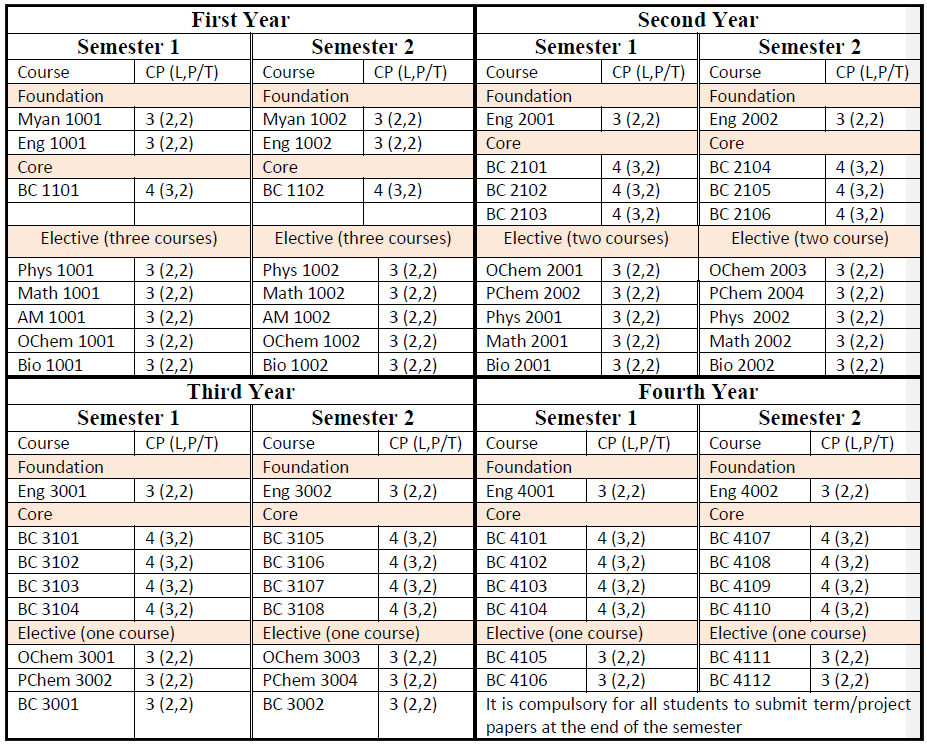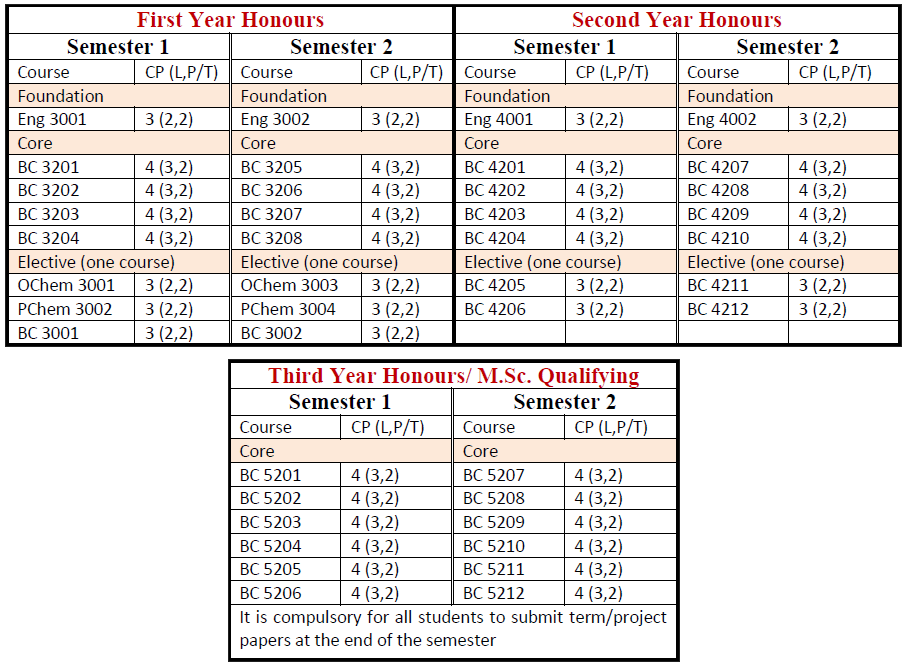Biochemistry
Curriculum
B.Sc. in Biochemistry

B.Sc. (Honours) in Biochemistry
Students who passed second year with GPA ≥ 4 are eligible to attend B.Sc. (Honours) classes for three more years. After finished successfully, they are earned B.Sc. (Hons) degree majoring in Biochemistry.

Course Descriptions
This module introduces students the definition of biochemistry and offers knowledge that biochemistry is essential to all life sources and normal biochemical forces in the view of the basis of health. It also reveals the chemical composition of human body, carbon as a major elements and complex biomolecules such as proteins, fats, carbohydrates, water and minerals. Then, students will learn the cell as the basis unit of biology, major intracellular organelles and their functions, subcellular fractionation, the experimental approach to isolation of molecules, determination of the structure of biomolecules, analysis and preparations that leads to study biochemical processes.
This module has two parts: Carbohydrates of Biochemical Importance; and Water and pH. First part deals with the importance of monosaccharides, hexoses, glycosides, deoxy sugars, amino sugars (hexosamines), disaccharides, polysaccharides and carbohydrates of cell membrane in biochemical processes. Second part enable students to understand body water, intracellular fluid and extracellular fluids; water as ideal biologic solvent; hydrogen bonds and molecular structure; water as a nucleophile; ionization of water; and pH and buffer solution.
It is the study of organic compounds which are made by living organisms, whether plants or animals. All life is based on the complex interrelationship of thousands of organic substances from simple compounds and fats to vastly more complex ones. So, this course describes basic information of bioorganic compounds such as saturated and unsaturated hydrocarbons, alkynes and functional groups. It is followed by introduction to organic reactions and poly functional compounds. The purpose of this module enable student getting knowledge on organic reactions that happen in lives.
This module deals with Amino Acids, Peptides and Structure of Proteins. First it enables students to familiarise with structures, ionic forms and optical isomers of amino acids. It is followed by peptides, Physiologically active peptides and Separation techniques for amino acids and peptides. Then, students will learn primary and secondary structures of proteins, tertiary globular proteins, quaternary structure of proteins and finally, denaturation of proteins.
This module is concerned with Enzymes that consists of nomenclature, classification, properties, enzyme catalysed reactions, factors affecting reaction velocity, enzyme kinetics, inhibition of enzyme activities, regulation of enzyme activities, and application of enzymes.
This module deals with Lipids of Biochemical Importance that includes fatty acids, triacyl glycerols, phospholipids, glycolipids and steroids.
The purpose of this module is to enable students to get insight in Nutrition. This module deals with nutrient requirements in human, energy requirements in human, macronutrient, minerals, dietary recommendation, nutrition and chronic diseases, and protein-calorie malnutrition.
The purpose of this module is getting students’ insight into the Biochemistry of Digestion and Absorption. It deals with digestion of carbohydrates and proteins, gastric juice composition, proteolytic enzymes, pepsin, trypsin, chymotrypsin, digestion of lipids, absorption from the gastrointestinal tract and enzyme deficiency.
This module concerns with Proteins. Students can learn about myoglobin and haemoglobin and their functions; the oxygen dissociation curve and mutant human haemoglobins.
The stereochemistry and aromatic compounds can be studied in First Semester. It includes isomers, enantiomers and meso compounds, and their designation and configuration; reactions of asymmetric carbon. In Second Semester, nomenclature, preparation and reactions of cyclic compounds can be learnt.
First module deals with introduction of energy efficiency, human age detection of polarization, thermodynamic reactions, spontaneous reactions, entropy, and free energy and offers in first semester. In second semester, students will learn on the concentration dependence of free energy and physical equilibra.
The purpose of this module is to offer students Basic Concepts of Metabolism describing Metabolic map, Catabolic and Anabolic pathway, Regulation of metabolism, Transduction by intracellular receptors, Transduction by cell-surface receptors and Intracellular messenger systems. In addition, it offers Bioenergetics and Oxidative Phosphorylation revealing what is meant by free energy, ATP as an energy carrier, electron transport chain and oxidative phosphorylation.
This module deals with Glycolysis that will explain about transport of glucose into cells, reactions of glycolysis, alternate takes of pyruvate, energy yield of glycolysis, clinical notes, and hormonal regulation of glycolysis.
This module concerns with Citric Acid Cycle, Hexose Monophosphate Pathway, and Uronic Acid Pathway. Students enable to know more about reaction, stoichiometry and regulation of the citric acid cycle. In addition, they will learn about hexose monophosphate pathway under the headings of oxidative and non-oxidative reactions, uses of NADPH, glucose-6-phosphate dehydrogenase deficiency and uronic acid pathway.
The module includes two parts. First part concerns with Glycogen Metabolism that includes structure, function, synthesis and degradation of glycogen; regulation of glycogen synthesis and degradation; and glycogen storage diseases. Second part deals with Gluconeogenesis that includes reaction unit, substrates for gluconeogenesis and regulation of gluconeogenesis.
The first part of this module deals with metabolism of monosaccharides and disaccharides; and students will learn the metabolisms of fructose, galactose and lactose. Second part deals with the structure of glycosaminoglycans and proteoglycans; synthesis and degradation of glycosaminoglycans; and the chemistry of micopolysaccharidoses. Third part intended students to familiarise with the structure and synthesis of glycoproteins, and lysosomal degradation of proteins.
The purpose of this module is to know the importance of Fatty Acid and Triacylglycerol Metabolism in the body. It deals with structure of fatty acid, de novo synthesis of fatty acid, mobilization of stored fats and oxidation of fatty acids, specialized fatty acids, and ketone bodies.
This module deals with Phospholipid Metabolism and students can learn the structure, synthesis and degradation of phospholipids.
This module reveals Cholesterol and Steroid Metabolism and students will learn structure, synthesis and of degradation cholesterol. In addition, it presents about bile acids and bile salts, plasma lipoproteins and steroid hormones.
In these courses, student will learn chemistry of alkaloids and heterocyclic compounds. In addition, the module describes the periodic table that important for chemicals and physiological effect on human beings. Moreover, chromatography and biochemistry of iron are also presented.
Amino Acid Metabolism and Nitrogen Metabolism composed of this module. Students will learn removal of nitrogen from amino acids, metabolism of ammonia, urea cycle, biosynthesis of non-essential amino acids, overall nitrogen metabolism, digestion of dietary proteins, transport of amino acid into cell, catabolism of the carbon skeletons of amino acids, role of folic acid in amino acid metabolism, and metabolic defects in amino acid metabolism.
The module deals with Glycolipid Metabolism and describe the structure, synthesis and degradation glycosphingolipids; and about sphingolipiddoses.
This module concerns with Enzyme Catalysis and Enzyme Kinetics and describes the role of cofactors in enzyme catalysis: NAD/NADP+, FMN/FAD, conenzyme A, biotin, TPP, pyridoxal phosphate, cobalamin, tetrahydrofolate and kinetics of enzyme.
This module composed of Porphyrin Metabolism and Nucleotide Metabolism.
The purpose of this module is to enable student to be equipped with research methodology. After completion of this module, students will know the basic concept of research methodology, the importance of literature survey before doing research, how to design a research, how to collect data and how to ananlyse the data collected. Finally, they will study report writing and make a presentation.
These modules deal with the Clinical Biochemistry.
Student can learn about vitamin supplements, water-soluble vitamins, fat-soluble vitamins and diseases caused by the deficiency of vitamins.
This module deals with Metabolism of Xenobiotics.
This module is about Molecular Biology and introduces students with Basic concepts of genetic information and Structural levels of nucleic acids.
This module concerns with Medical Biochemistry. It covers mechanism of reaction at molecular level of selected antibiotics, anti metabolites, analgesics, hallucinogens and other drugs, mechanism of resistance to antibiotics and other drugs. In addition, lysosomes and their physiological role will be described. Then, students will learn about cerebrospinal fluid, and its composition in health and disease. Moreover, it includes blood coagulation, clotting factors, mechanism of coagulation.
This module is concerned with inorganic nutrients such as sodium, potassium, chloride, water, iodine, iron, calcium, phosphate, magnesium, manganese, zinc, copper; molybdenum, sulfite and sulfate; selenium and glutathione; and other inorganic nutrients.
First module deals with Air Pollution and includes Particular matter; compounds of carbon, sulphur, nitrogen and their interactions; methods for their estimation and their effects on atmosphere.
Second module concerns with Water Pollution and reveals types of water bodies and their general characteristics; major pollutants in domestic, agricultural and industrial wastes; methods of their estimation; effects of pollutants on plants and animals; and treatment of domestic and industrial wastes, solid-wastes and their treatments.
Second module concerns with Water Pollution and reveals types of water bodies and their general characteristics; major pollutants in domestic, agricultural and industrial wastes; methods of their estimation; effects of pollutants on plants and animals; and treatment of domestic and industrial wastes, solid-wastes and their treatments.
These modules are about hormone and its classification, mechanism of hormones action, hormone that regulate fuel metabolism; and hormone that regulate salt and water balance, hormones that regulate calcium and phosphate metabolism; hormones that regulate body size and metabolism; hormones that regulate the male reproductive splim and hormones that regulate the female reproductive splim.
These modules are about Secondary Metabolism.
This module deals with DNA replication, Transcription, Translation and regulations of gene expression, Mutation and repair, and Recombinant DNA technology
This module deals with Separation Methods of Enzymes, Amino Acids, Proteins and Nucleic Acids.
The purpose of former module is to enable students to familiarise with Basic Principles of Biochemical Technology such as protein purification, protein analysis, DNA analysis, fragmentation, gel-electrophoresis, Sanger Dideoxy method, and the polymerase chain reaction.
The later module is concerned with chromatography, the separation techniques widely use in biochemical analysis.
The later module is concerned with chromatography, the separation techniques widely use in biochemical analysis.
This module is about Bioenergetics and Radioisotopic Techniques.
The purpose of this module is to enable students to gain knowledge about a prevalent metabolic disease, cancer. It explains about cancer of the large bowel, genetic changes that result in cancer, RAS and the MAP Kinase signaling pathway, mutations in the RAS gene and cancer, Cadherin Protein, epidemiology of diet and colon cancer.

